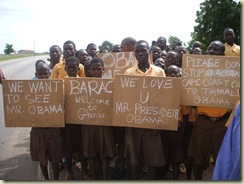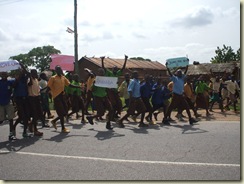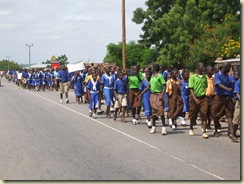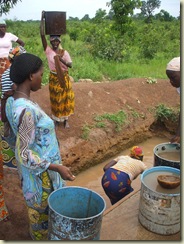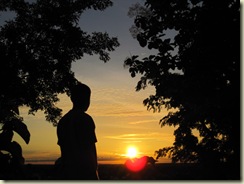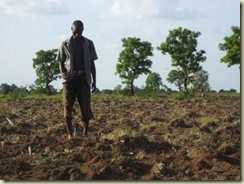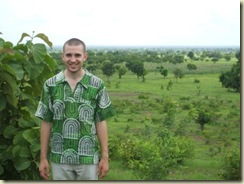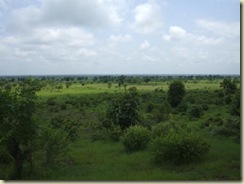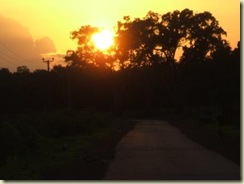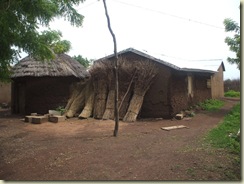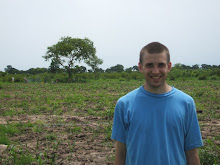Here is the continuation of those questions and answers. I suggest you read the post below this one first (Q & A: Part 1). But it probably doesn’t make a difference. I decided to post both of these at the same time, because I’d feel bad if I made you wait.
15. How much of an initial shock was there? How long did it take to get over?
Aside from one initial shock in my second week involving inadequate sanitation facilities, I can’t say the initial shock was that “initial”. I think it took a while to sink in. I was so excited to get going, and to be here that I just went with everything that was thrown my way. It was only little by little are started to feel just how different things were.
The shock I’m referring to above came about when I was staying with my coach Sarah and another OVS Wayne. Their place didn’t have a latrine yet so when you needed to take care of business, you simply went anywhere outside, in a patch of grass where people didn’t walk. It was an extremely strange and uncomfortable experience, especially given the lack of privacy. No matter where you crouched, there were people around. But other than that things mostly flowed along for a while, it took me a while to realize some of the things I hadn’t noticed or cared about in the beginning. But I’ll expand on that in the next question.
9. How are you adapting? Do you feel you are experiencing any culture shock?
As I mentioned it took some time, but little by little I started to get extremely frustrated with the difficulties communicating.It got tiring having to ask the same questions over and over again in different ways, and I didn’t like how I couldn’t relax anywhere other than in the privacy of my room (even then, I can’t leave my window open), because I was constantly a focus of interest and people constantly read into everything that I did farther than necessary. I started to feel alone and cut off, and I started being frustrated with myself for how much time I was spending alone, even though I didn’t have the energy, or the motivation to go out.
As for how I’m adapting, I’d say its a struggle I still face, and occasionally there are dips in my mood. But for the most part I’ve been feeling a lot better. I started by allowing myself to feel comfortable taking time away from everything just to recover and to escape. Once I had admitted to myself that it was ok to do that once in a while, I was able to use that time actually regaining energy instead of further draining myself by brooding about wasting time. Then I sort of just threw myself into it and was really helped by my friend Rahman who has been showing me around, introducing me to people, and has been someone that I can ask about cultural stuff. Learning bits of the language was also an occasional confidence booster, because it felt great when people were really impressed by what I already knew.
Some things still trouble me from time to time, but I always find a way through, whether its by reading, focusing on work and getting motivation from success there, or communicating with someone back home or here in Ghana.
3. Is the government encouraging a certain type of entrepreneurship?
If by “certain type of entrepreneurship” you mean they are promoting the creation of small businesses then I would say yes, that’s what they have in mind. But the government doesn’t really have a whole lot of influence over what I am doing here, and I haven’t yet seen any similar programs elsewhere. So they aren’t actively pushing one thing or another. I think when they raised the issue, their hope was that youth would be able to create their own employment, and I believe the prevailing view here is that that means creating small businesses.
As for other types of entrepreneurship, I interpret that to mean the role entrepreneurship can play in other areas like, social entrepreneurship, or entrepreneurship within larger companies or organizations, or creating specifically growth oriented businesses. As a generalization, most people I’ve spoken to here don’t seem that interested in or aware of those options.
4. What happened to your laptop?
So it appears that there was a manufacturing defect in the wire that carries the signal from computer to screen. It must have been triggered by a bump or a jostle while it was in my book-bag, but this one part of the wire seems to have a weak connection, causing the screen to go all wonky and useless. I was able to continue to use my laptop at the office when one of the two computers was free, by hooking up to the monitor. Unfortunately the computers weren’t free all that often. So a week ago I brought it to a computer guy in Tamale, who took a look and found the defect, and told me the wire would need to be replaced. He also told me that it would be way too expensive to try and do here, and that I should wait until getting home. He insisted there was nothing he could do and decided to open it up and show me exactly what was going on. He showed me how if you pushed on this one part the screen went back to normal. Seeing this, I suggested just putting something in side that would take up the extra space and cause the wire to stay in the position where it worked. At first he seemed to think that that would be impossible, but after some persistence we got some paper to shove in next to it, and now it works fine, although I had to do some alterations and additions to the paper once I got home to make it survive any sort of movement. So basically I, with zero experience, fixed my computer, even if it is only temporary.
7. What ideas/principles learned, while working with EWB in St. John’s have you been able to usefully apply while working in Ghana?
One thing that EWB did prepare me for was being flexible with time. I think perhaps EWB learned its habit of running behind from their volunteers who’ve returned from Africa. It’s not an exaggeration that nothing happens on time.
But seriously, the first and perhaps most important thing that has helped me has been to focus on my strengths. Back home I began to learn through my work with the chapter that there were some things I was good at and others that I was not so good at. Being aware of those things, and being able to pull out the skills you need at the right time has been extremely helpful. For example I was able to adapt my research methods as I discovered what did and didn’t work. If I hadn’t learned to adapt like that back in St. John’s I may have just continued asking the same types of questions, questions that weren’t getting useful answers. But because I had learned to search out the problems, and look to what was working well I was able to shift my questioning style to get better results.
Another thing that has helped, is the experience I gained through outreach of interacting with people face to face. You have to be able to gauge when you’re losing their interest and then adapt, and you need to know when you’ve gotten them excited and use it. This has come in handy when pitching ideas to individuals at the college, and when conducting interviews.
School Outreach has also provided lessons for how to interact with a full class of students. I’ve found that at least for me, I feel I’m more effective when I quickly distance myself from the discussion style of their usual teacher(s). Sometimes it means allowing a bit more goofing around and joking, or simply being open to each and every person’s opinions. I find that if you come from an angle they weren’t expecting than they are willing to give you a chance, instead of treating it like a free period because some guest speaker is in.
That’s not to mention everything I learned about development and rural livelihoods back at the chapter. It’s all been extremely helpful in simply understanding what’s happening around me.
8. In the short amount of time you’ve been there, do you feel like you’re already having an impact? If so, how do you plan to add on to it?
I definitely feel as though the information I’ve gathered so far will be useful. And I also feel that the conversations I’ve had with my coach and with the Vice-Principle will help inform how both move forward in their partnership, so in that way I feel that if I for some reason I were teleported out of the placement, the work that I’ve done would have been a solid contribution.
However, I feel that my placement is a little unique since influencing my partner to undergo some behaviour change or attitude change is not really one of the primary goals. The administration seems to already be on board, and doing their job to the best of their abilities. As such, some of the behaviour change projects that some volunteers implement with their partners are not really relevant to the specific goals of my placement.
As well, the immediate beneficiaries are students and not Dorothy. So I’m not sure if I can measure my impact in the usual way. I need to look to the proposal that we make at the end of the placement and the information that I’ve gathered to see the impact that I’ve had. In fact, those things won’t really have an impact until a future volunteer puts them into action.
On the other side of things, the placement has certainly begun to have a serious impact on me, my eyes have been opened to so much and I’m constantly learning. I also hope that my communications back home have had some small impact on those who receive them.
10. What parts of the culture are you finding really interesting? What are most surprising to you?
The importance of age, and the role it plays in all relationships is quite interesting. We must all bow when we greet an elder, your relative age determines whose bidding you do, and who does yours. Elder siblings get the stools to sit on, and younger children must go fetch things for others. The special treatment that I get as a guest is usually explained in terms of the relationship between siblings of different ages.
I also find it really interesting how everyone at work refers to each other by their title. Other JFs have told me it’s the same at their offices. So Dr. Bempong is simply Vice (for Vice-Principle) Nicholas is simply Storekeep, and my host-father is Operator (for Tractor Operator).
The importance of greetings cannot be understated. At first I thought “Oh yeah, I got it, make sure you greet everyone.” But it is huge, when I started observing others more carefully, I noticed how terribly wrong I have been doing it, and how thorough others are in their greetings.
11. We know that you were involved in Fair Trade before you left, has your point of view changed since you have been there.
First I should let you know what exactly my point of view is. I see Fair Trade as something worth promoting. I strongly believe in the benefits it brings to the farmers that are involved. In a system that is clearly broken, FT offers an alternative path for conscious consumers to adequately reward the work that went into the product that they are enjoying. I also see Fair Trade as an excellent outreach tool. By introducing people to Fair Trade, and by influencing people to buy it you assist people in becoming more globally aware. You bring those that were totally unaware of the injustices of trade to a level of understanding that helps them see that there is a problem. You allow those that see the problem but feel helpless, to feel like there can be solutions. And you hopefully bring everyone to a point where they feel more connected with the products they are consuming and with those who made them, so that maybe they begin thinking about their other habits and choices on a more global scale.
I also believe that it is important to realize and communicate that Fair Trade is not a silver bullet, and as it is currently designed cannot be seen as a replacement for our current trading system. It helps those who are involved at both ends of the chain, and still has quite a bit of room to grow to involve more producers and consumers, but that growth has a limit.
One of the criticisms of Fair Trade is that by creating an artificial price, it distorts the market. This would be true if Fair Trade held a larger share of the market, but since Fair Trade accounts for such a small percentage of the markets in which it is involved (even with the involvement of Starbucks and Cadbury) it does not create any meaningful distortions in price, supply, or demand. The flip side of this argument (as far as I understand it) is that Fair Trade cannot grow infinitely; otherwise the criticism of price distortion will become true.
The other criticism of Fair Trade is that it actually disadvantages farmers and producers who are not certified. Again, as far as my understanding goes, this is untrue because of the scale which we are talking about. Since it does not have an overall impact on prices, supply, or demand outside its own value chain, it doesn’t strongly affect other farmers. In fact, many of the investments that are put in place as a result of the Fair Trade price, such as schools and wells, actually benefit others in the community who are not certified.
As for the focus of your question, my point of view hasn’t really changed. I think I might feel more strongly about it, having met people that I believe could seriously benefit from Fair Trade or a similar system but I have not yet met anyone who has had any involvement.
13. What is your most exciting experience so far?
My most exciting experience so far was probably getting things ready for this Obama campaign. It felt really great as things fell into place. I should probably explain the whole thing first. So Obama will be visiting Ghana on July 10, and some OVS on the Governance and Rural Infrastructure team decided it was a good opportunity to get youth and communities in Northern Ghana thinking about leadership and community activism. So they launched a campaign to convince Obama to visit the Northern part of the country, which has historically been neglected by foreign dignitaries and is also the most impoverished. The focus of the campaign was gathering letters from students that would express the reasons why Obama was admired as a good leader and why he should visit the North. The OVS asked the JFs to try and gather as many letters as possible.
At first I really didn’t think that I would be able to gather many letters, if any at all. But I was put in contact with two local teachers who are part of a small association focused on community improvement. With their help I contacted all the schools in Pong-Tamale and five in Savelugu (the larger neighbouring town), and organized a march in support of Obama. As schools agreed to participate and things started to come together for the march I experienced the most excitement I’ve felt all placement. In the end we collected 934 letters and held a march here in Pong-Tamale with all four schools and about 400 students. Few experiences have matched with the feeling I had when leaving the local government office with the full support of everyone there, or with the feeling I had seeing hundreds of students walking down the road in march that I helped organize.
P.S. – It turns out that I gathered way more letters than all the other JFs combined, and our march was bigger than the march in Tamale. Although, they had a car with loudspeakers.
